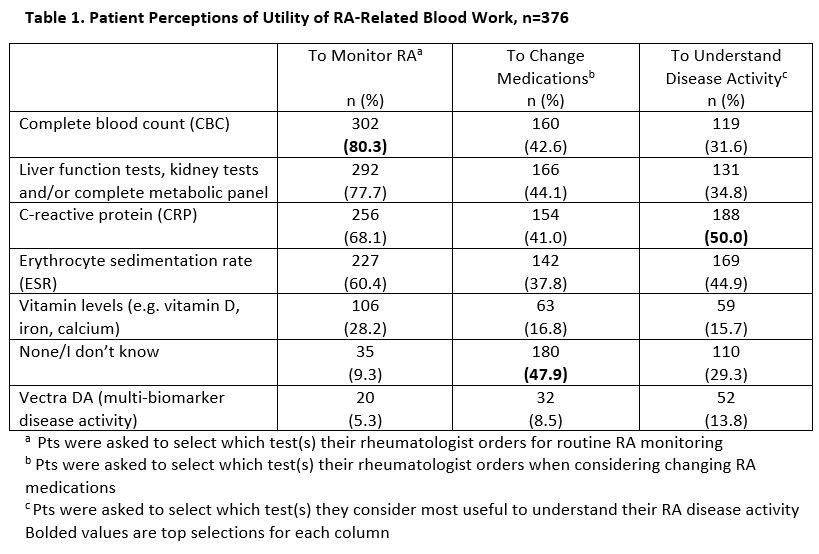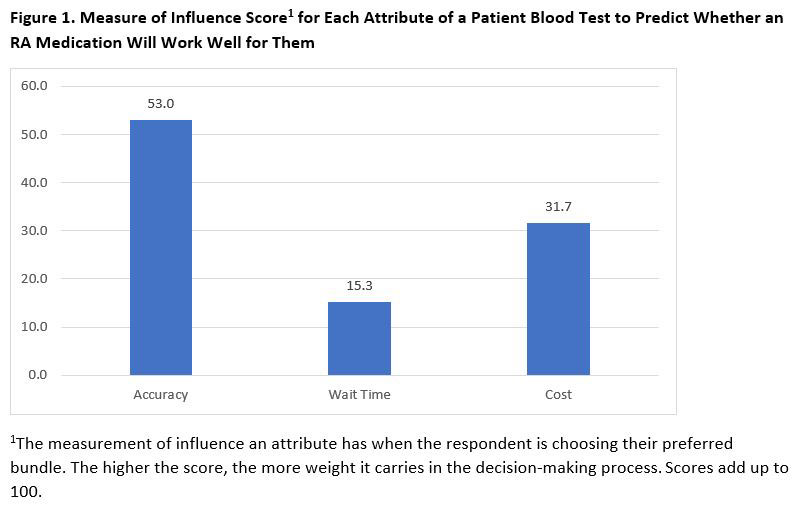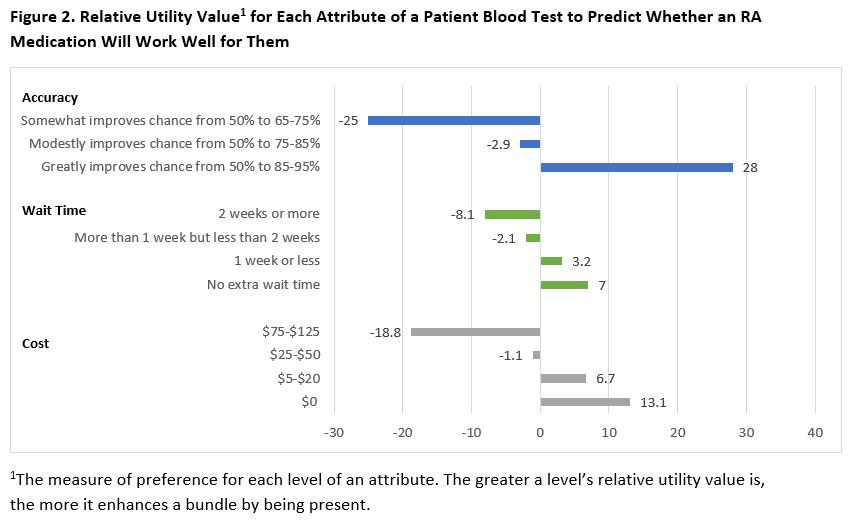Session Information
Session Type: Poster Session C
Session Time: 1:00PM-3:00PM
Background/Purpose: Although patients’ (pts) perspective on disease-related lab testing and its role in treatment decision-making has been examined for some chronic illnesses, ranging from diabetes to prostate cancer, no published studies have assessed the perspectives of people with RA. Our objective was to examine how pts with RA perceive RA-related lab testing and pts’ perceived utility of a blood test to predict treatment response and allow for personalized selection of a new RA medication.
Methods: A cross-sectional survey was developed with input from pts, rheumatologists, researchers, and pt advocates. Members of ArthritisPower with a self-reported physician diagnosis of RA were invited to participate in the online survey which included questions related to reasons for lab testing, plus a choice-based conjoint analysis (CA) exercise to determine how pts value different attributes of a blood test to predict treatment response. For the CA, 48 different hypothetical test characteristics (bundles) were created based on different combinations of 3 test attributes (Accuracy, Wait Time, Cost), each with 3-4 levels. Each pt responded to 5 questions asking them to choose between two of these hypothetical tests, randomized by the Qualtrics survey platform.
Results: During May 2022, 376 RA pts completed the survey, of whom 86.4% were female, 89.3% white, mean age of 58.1 (SD 11.3) years. Pts were on the following medications: 53.2% csDMARD, 79.6% bDMARD, 20.1% tsDMARD (not mutually exclusive). Reasons that most pts perceived that their doctor orders lab work was to check for active inflammation (86.4%) or assess side effects of medications (81.6%). Other reasons included checking for positive rheumatoid factor or other RA antibodies (67.8%), or whether medication is working (59.3%), vitamin levels are good (55.3%), or RA is progressing (54.3%). Pts reported that their rheumatologists most often ordered complete blood count, liver function tests, CRP and ESR to monitor RA, and felt that CRP was most helpful to themselves in understanding their disease activity (Table 1). Most pts were somewhat or very concerned that their current RA medication will stop working for them in the future (91.0%) or that they would waste time trying an RA medication that may not work for them (81.6%). If they had to change RA treatments in the future, a majority (89.4%) would be very or extremely interested in taking a blood test that could help predict whether the medication their doctor suggests will work well for them. In the CA, Accuracy was more important to pts than both Cost and Wait Time (Figure 1). Pts were more likely to select a test that was highly accurate (improving the chance that the next RA medication will work well from 50% to 85-95%), low cost (≤ $20), and fast (≤ 7 days for results) (Figure 2).
Conclusion: Most pts consider RA-related blood work to be important for monitoring active inflammation and medication side effects, and felt that among blood tests, CRP was most helpful to them in understanding their disease activity. For a test predicting treatment response, pts valued accuracy over cost or wait time.
To cite this abstract in AMA style:
Nowell W, Venkatachalam S, Gavigan K, George M, Withers J, Stradford L, Rivera E, Curtis J. Patient Perceptions of Rheumatoid Arthritis Blood Work: A Cross-sectional Survey in the ArthritisPower Registry [abstract]. Arthritis Rheumatol. 2022; 74 (suppl 9). https://acrabstracts.org/abstract/patient-perceptions-of-rheumatoid-arthritis-blood-work-a-cross-sectional-survey-in-the-arthritispower-registry/. Accessed .« Back to ACR Convergence 2022
ACR Meeting Abstracts - https://acrabstracts.org/abstract/patient-perceptions-of-rheumatoid-arthritis-blood-work-a-cross-sectional-survey-in-the-arthritispower-registry/



